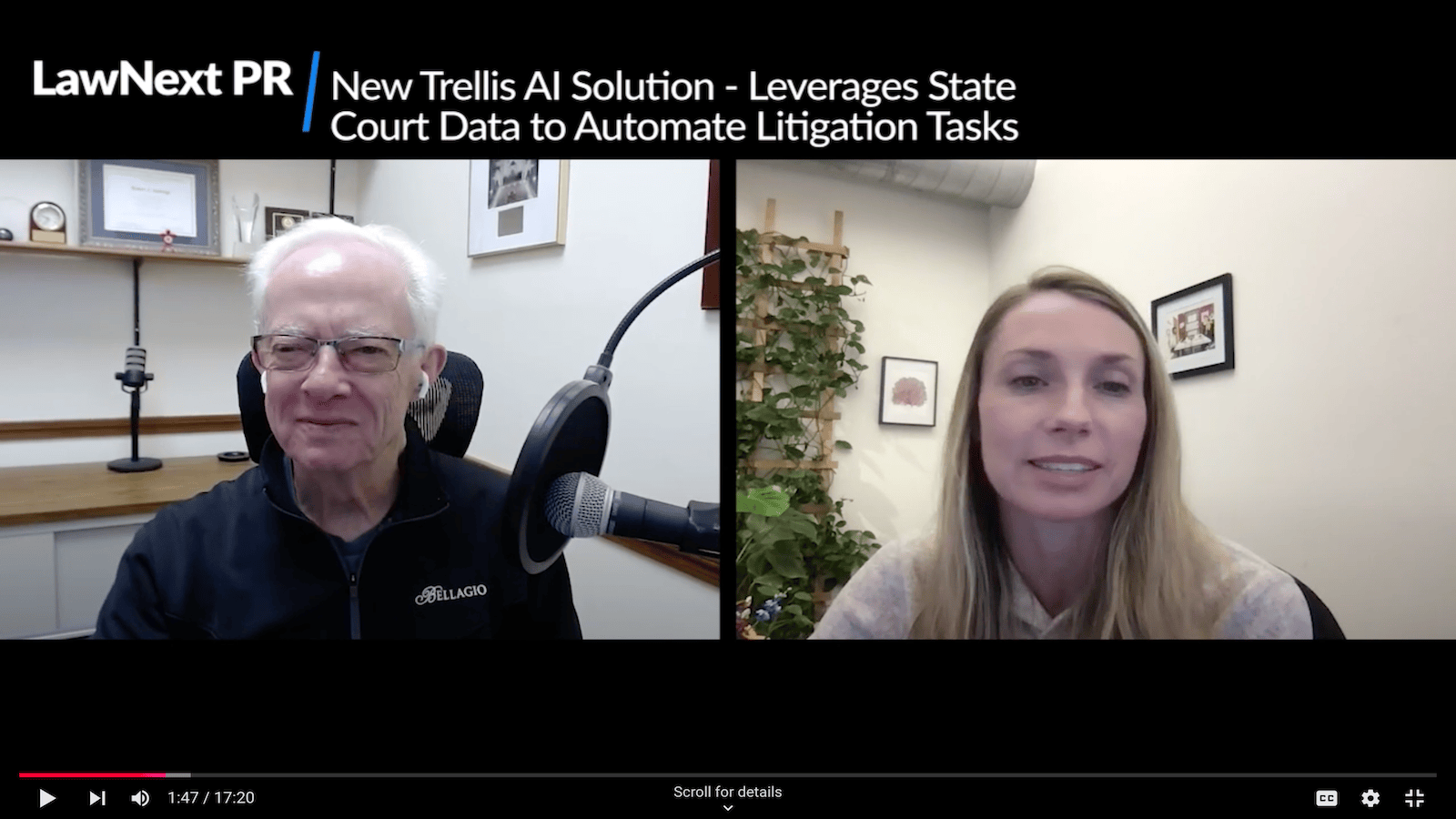In today’s episode of the LawNext PR podcast, host Bob Ambrogi interviewed Nicole Clark, the founder and CEO of Trellis, about the company’s latest innovation: Trellis AI. This new suite of generative AI tools builds on Trellis’ comprehensive database of state trial court data to assist litigators in simplifying complex litigation tasks. You can read more about Trellis AI below.
Bob’s own impressions of Trellis AI from a demo of the product can be found in his original article from November 19, 2024.
Trellis AI: Transforming State Trial Court Research with Advanced Legal Analytics
Bringing Transparency to Trial Court Data
Trellis, a leader in legal analytics, has revolutionized access to trial court data by aggregating and structuring information from over 2,600 counties across 45 states. Historically, state trial courts have operated in an opaque and fragmented manner, making research and analysis difficult. With a database containing hundreds of millions of motions, briefs, and judicial rulings, Trellis provides lawyers with deep insights into litigation trends and court decisions.
Nicole Clark, a former litigator and co-founder of Trellis, highlighted the critical gap that the platform aims to address:
“In the court system where every case starts—trial court—we just had a black box.”
By leveraging AI and data-driven insights, Trellis is working to illuminate this “black box,” offering legal professionals a competitive edge in litigation.
Trellis AI: Key Features and Tools
Motion Drafting Made Smarter
One of Trellis AI’s standout capabilities is its Draft Arguments Tool, which enables attorneys to efficiently generate legal motions by analyzing successful arguments from past cases. This tool:
- Automates Motion Drafting: Supports motions for summary judgment (MSJ) and motions to dismiss, providing structured arguments tailored to specific case facts.
- Offers Citation-Backed References: Each draft includes direct citations and source links for verification, ensuring accuracy and reliability.
- Expands Jurisdiction Coverage: Initially available for California, the tool is set to expand to key legal markets such as New York, Texas, and Florida.
Comprehensive Case Assessments
Trellis AI enhances case preparation with dynamic reports that deliver:
- In-Depth Case Summaries: Highlighting key facts, claims, defenses, and potential legal strategies.
- Gap Analysis & Next Steps: Identifies missing evidence, weaknesses, and recommended actions.
- Live Updates: Case reports evolve as new documents are uploaded, serving as an ongoing playbook for litigators.
Advanced Document Analysis Tools
Trellis AI streamlines legal research and document review with:
- Complaint Analysis: Breaks down causes of action, suggests defenses, and highlights relevant statutes of limitations.
- Argument Dissection: Identifies key evidence, potential witnesses, and weaknesses in legal filings.
- Summarization & Citation Extraction: Generates concise document summaries, organizes chronological timelines, and extracts legal references for further research.
User-Friendly Design with Robust Security
Unlike many AI-driven legal tools that require detailed prompt engineering, Trellis AI prioritizes ease of use. With one-click functionalities, attorneys can quickly generate motion drafts, case assessments, and document reviews without needing specialized AI expertise.
Security is also a core focus. Trellis AI:
- Complies with SOC 2 Standards for data protection.
- Encrypts All Uploaded Documents to maintain confidentiality.
- Ensures Private & Secure AI Outputs, safeguarding sensitive legal information.
Future Expansion: Scaling AI-Powered Litigation Tools Nationwide
While Trellis AI’s motion drafting capabilities are currently focused on California, the company is actively expanding into additional states. The platform’s growing reach will provide litigators across various jurisdictions with tailored AI-powered legal research and drafting solutions.
Industry Impact: What Sets Trellis AI Apart?
Early adopters have praised Trellis AI for its efficiency, accuracy, and time-saving capabilities. Unlike generic AI models, Trellis AI leverages a proprietary dataset of trial court documents, allowing for more precise and relevant legal outputs.
Rather than replacing legal professionals, Trellis AI enhances their strategic capabilities, empowering litigators to focus on high-value legal work while automating repetitive tasks.
Conclusion: The Future of Legal Tech with Trellis AI
Trellis AI is setting a new standard in legal technology by combining extensive trial court data with powerful AI automation. By eliminating time-consuming litigation tasks, the platform enables lawyers to focus on case strategy and outcomes.
As Nicole Clark puts it:
“Our goal is to deliver the best results in the simplest way for our users.”
With ongoing expansion and innovation, Trellis AI is poised to become an indispensable tool for trial court litigators nationwide.
For more information, visit Trellis at trellis.law.

